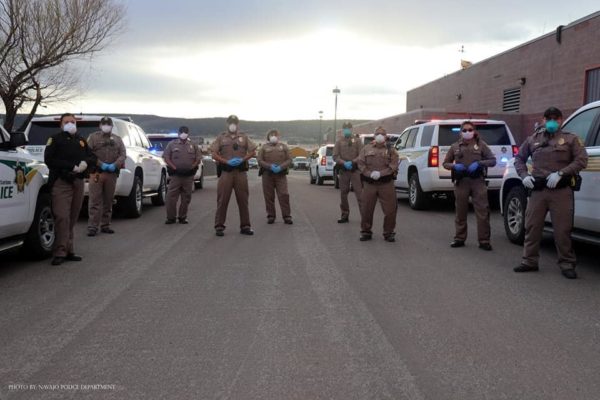
- Details
- By Native News Online Staff
Published July 1, 2020
5,218 recoveries, 17 new cases, one more death reported as Navajo Nation extends emergency declaration, government closure, and weekend lockdowns
WINDOW ROCK, Ariz. — Coupled with a surge of COVID-19 cases in Arizona and on the Navajo Indian Reservation, Navajo Nation officials on Tuesday have extended a state of emergency that keeps government offices and entities closed until July 26, 2020.
The Department of Health also issued another Public Health Emergency Order to implement full 57-hour weekend lockdowns from July 3, 2020 to July 6, 2020 from July 10, 2020 to July 13, 2020, and from July 17, 2020 to July 20, 2020, starting at 8:00 P.M. (MDT) on Friday and ending at 5:00 A.M. (MDT) on Monday. Additional weekend lockdowns may follow.
"The data presented by the Department of Health strongly indicates that the precautionary measures we have implemented since the start of the virus on the Navajo Nation in mid-March are working. We have to remain focused and not let up," Navajo Nation President Jonthan Nez said on Tuesday. "
Other states began relaxing their precautionary measures far too soon and now they are seeing the consequences with large increases in new cases, hospital visits, and hospital bed usage. Here on the Navajo Nation, we are seeing good signs, but we have to keep the weekend lockdowns and other measures in place for the time being," Nez continued.
On Tuesday, the Navajo Department of Health, in coordination with the Navajo Epidemiology Center and the Navajo Area Indian Health Service, reported 17 new COVID-19 positive cases for the Navajo Nation and one more death. The total number of deaths is 364 as of Tuesday. Reports from all 12 health care facilities on and near the Navajo Nation indicate that approximately 5,218 individuals have recovered from COVID-19. 55,626 people have been tested for COVID-19. The total number of COVID-19 positive cases for the Navajo Nation is 7,549.
Navajo Nation COVID-19 positive cases by Service Unit:
- Chinle Service Unit: 1,945
- Crownpoint Service Unit: 662
- Ft. Defiance Service Unit: 470
- Gallup Service Unit: 1,277
- Kayenta Service Unit: 1,073
- Shiprock Service Unit: 1,212
- Tuba City Service Unit: 641
- Winslow Service Unit: 265
* Four residences with COVID-19 positive cases are not specific enough to place them accurately in a Service Unit.
During a live town hall held on Tuesday, President Nez presented data from the Department of Health that shows a steady flattening of the curve for COVID-19 cases indicating that the weekend lockdowns, daily curfews, requiring face masks, and other precautions are working.
In addition to the weekend lockdowns, the daily curfew also remains in effect from 8:00 p.m. to 5:00 a.m. on weekdays to help flatten the curve.
To Donate to the Navajo Nation
The official webpage for donations to the Navajo Nation, which has further details on how to support the Nation’s Dikos Ntsaaígíí-19 (COVID-19) efforts is: http://www.nndoh.org/donate.html.
For More Information
For more information including reports, helpful prevention tips, and more resources, please visit the Navajo Department of Health’s COVID-19 website at http://www.ndoh.navajo-nsn.
For up to date information on impact the coronavirus pandemic is having in the United States and around the world go to: https://www.worldometers.info/coronavirus/country/us/?fbclid=IwAR1vxfcHfMBnmTFm6hBICQcdbV5aRnMimeP3hVYHdlxJtFWdKF80VV8iHgE
For up-to-date information about COVID-19, Native News Online encourages you to go to Indian Health Service’s COVID-19 webpage and review CDC’s COVID-19
More Stories Like This
Native News Weekly (August 25, 2024): D.C. BriefsUS Presidents in Their Own Words Concerning American Indians
NDAA passes House; Lumbee Fairness Act Advances
NFL, Vikings to Host Native All-American Game, Youth Flag Clinic
Senate Committee on Indian Affairs Passes 12 Bills to Strengthen Tribal Communities
Help us defend tribal sovereignty.
At Native News Online, our mission is rooted in telling the stories that strengthen sovereignty and uplift Indigenous voices — not just at year’s end, but every single day.
Because of your generosity last year, we were able to keep our reporters on the ground in tribal communities, at national gatherings and in the halls of Congress — covering the issues that matter most to Indian Country: sovereignty, culture, education, health and economic opportunity.
That support sustained us through a tough year in 2025. Now, as we look to the year ahead, we need your help right now to ensure warrior journalism remains strong — reporting that defends tribal sovereignty, amplifies Native truth, and holds power accountable.
 The stakes couldn't be higher. Your support keeps Native voices heard, Native stories told and Native sovereignty defended.
The stakes couldn't be higher. Your support keeps Native voices heard, Native stories told and Native sovereignty defended.
Stand with Warrior Journalism today.
Levi Rickert (Potawatomi), Editor & Publisher

